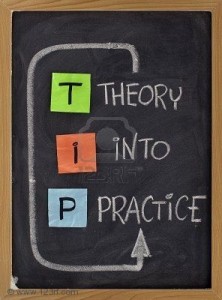I have been on the road again this week delivering training in a number of schools. I really enjoy the experience and always learn from the people I work with and it is tremendous fun. However, as a trainer I know that sessions packed full of practical strategies will go down really well and this is beginning to trouble me. I worry that theory and context are almost vilified in the profession and we can no longer see past the quick fix of a good practical tip.
Before going on I would like to say that I exclude the users of twitter from this description – they are keeping the art of theory alive (take a look at #edjournal for proof). They are, however, a minority and only in the most enlightened schools are they central to decision making.
This trend is worrying for three reasons:
1. Teachers, in general, are not interested in theory. The sessions where there is a substantial theory base will always get a weaker reception. Teachers want ‘stuff’ they can take away and use tomorrow. While I always show how the theory works in practice, it never seems to have the same impact as CPD with titles like ’10 engaging starters’ or ‘7 great discussion tools’. While there is a place for practical tips, but I know that this approach offers little impact. A good idea might be used once or twice, but understanding how it works and why it works will bring lasting and sustainable alterations to teaching methods. The ‘quick fix’ is just that and somewhere down the line a proper solution needs to be found. I see too many Senior Leaders promoting ‘Sharing Good Practice’ sessions as the way to improve teaching and learning in their schools. While it will allow for a dialogue to be a created about learning it needs to be followed up with a ‘Sharing Good Theory’ session where staff explain the philosophy behind the techniques that they use and why it leads to better learning.
2. If we can’t see the relevance of theory then how do we move forward? If only a small minority are reading about new approaches and trying them out, experimenting and refining, how can the profession raise itself up to better standards? Few people have heard of or seen Sir Ken Robinson, hardly anyone has read Geoff Petty or John Hattie, let alone slightly leftfield texts like those by Steven Johnson or Daniel Pink. I am concerned that standards will not improve in the majority of schools, because no one is looking into what is possible and exciting.
3. I think the attitude of the profession at large towards CPD and theory plays into the hands of our critics. Some politicians and large chunks of the population see teachers as lazy and stuck in their ways. They view teaching as being a simple set of skills, that as Michael Gove put it can be passed on from the master ‘to the apprentice’. I firmly believe that teaching is a highly creative discipline, providing tremendous scope and freedom to experiment. But it also consists of patterns and lines that can be follewed to create a more firm understanding of the students in front of you. Without theory to map a route we are either aimless or rigid, and neither is good enough in education. I find it hard to imagine a doctor being negative about new approaches in their specialism, or lawyers refusing to read the lasted case law. Why should teachers resent good CPD and theory?
I have talked to many teachers about this and most feel under pressure to perform well with exam groups and to meet expectations. They get observed occasionally, pull out a few tricks and set pieces, and then get back on the treadmill of reports, emails, marking and planning. They feel like they do not have the time to read theory and experiment, it intrudes on their daily business of survival. Also, the quality is not always there in CPD sessions and people get turned off. It is hard not to feel sympathy for this argument, but we need to break it down and move the agenda on. Leaders need to take bold decisions and teachers need to talk about theory, share it, just like we do on twitter, and help to breathe new life into our unthinking profession.


